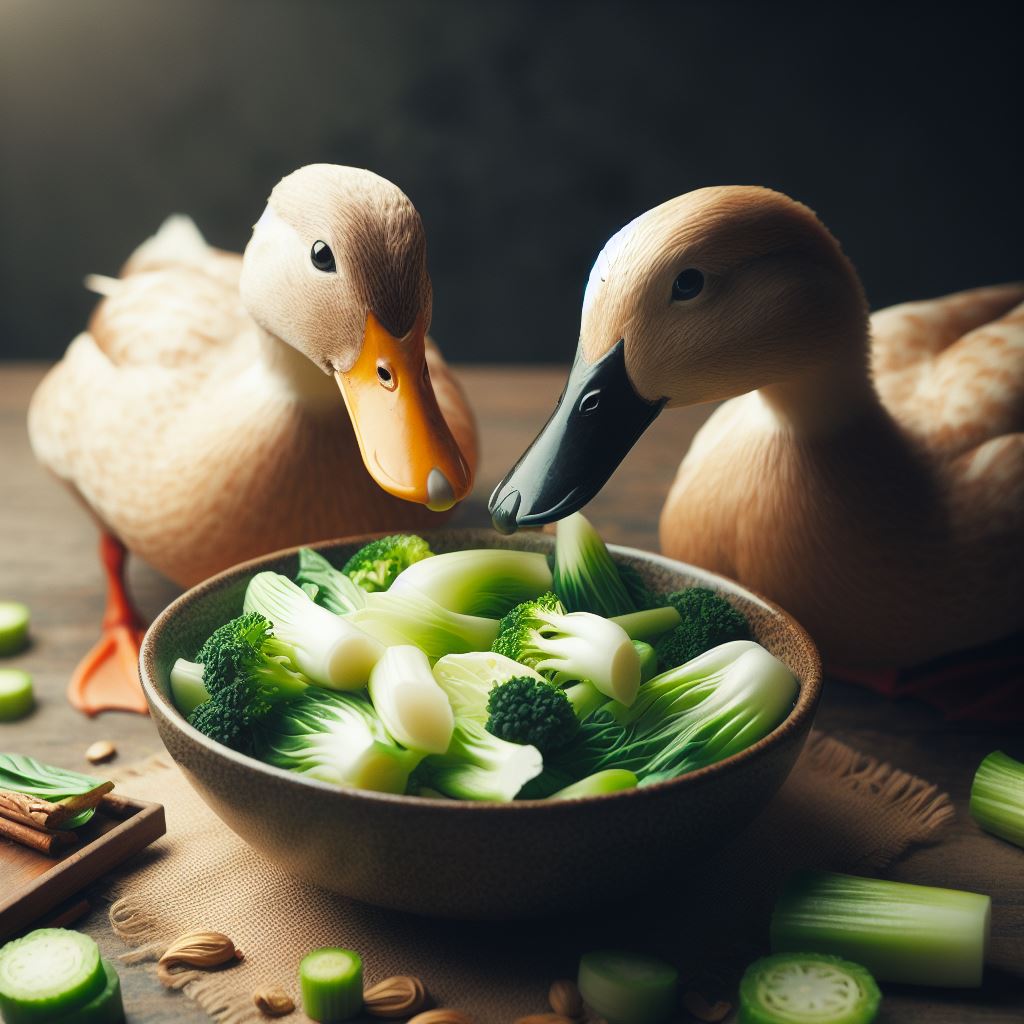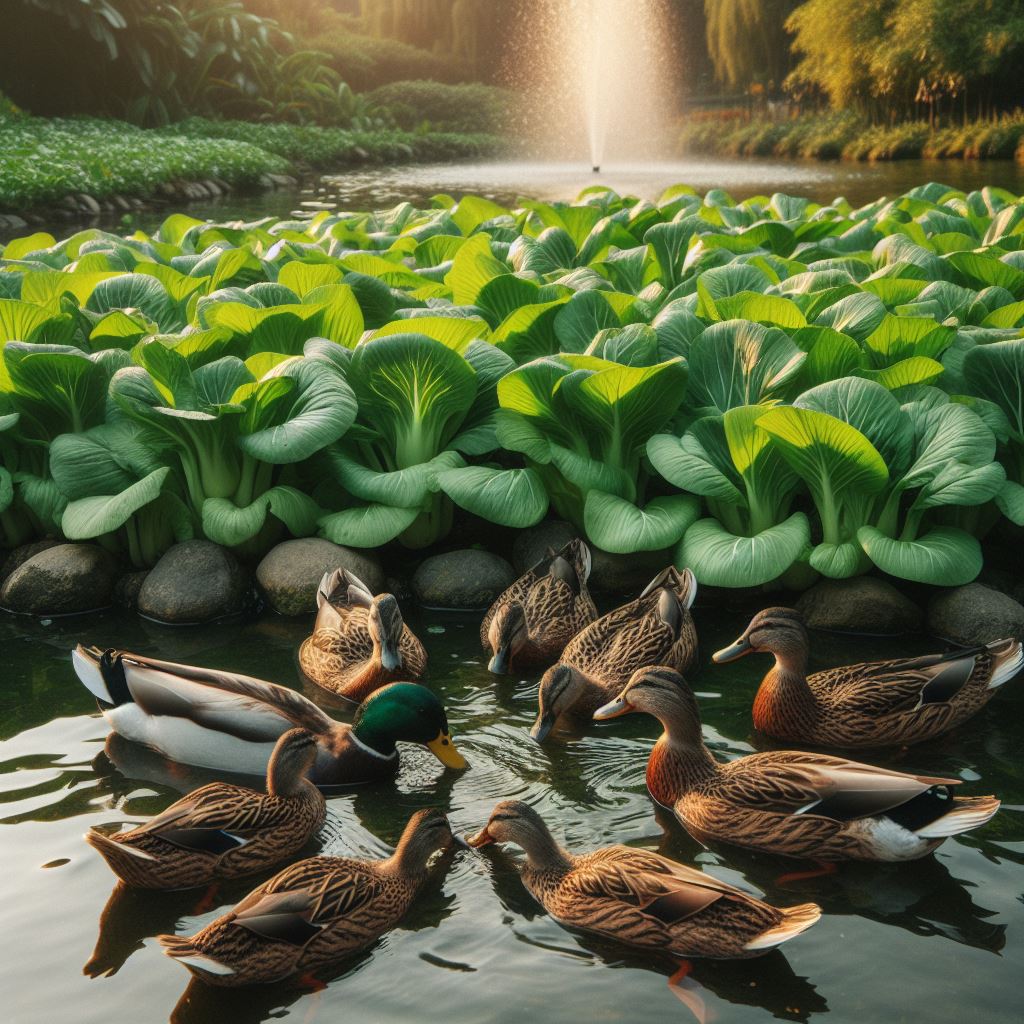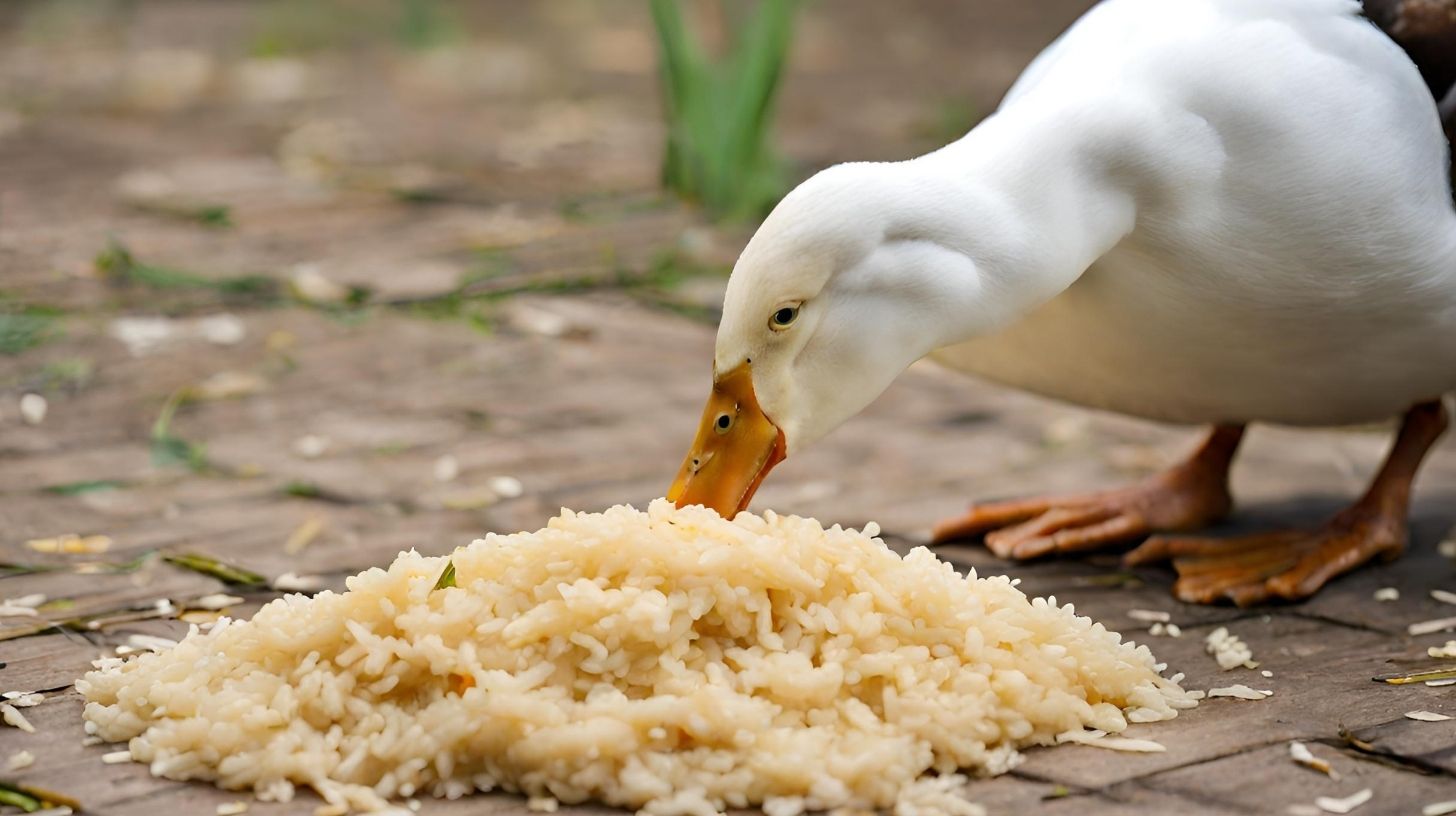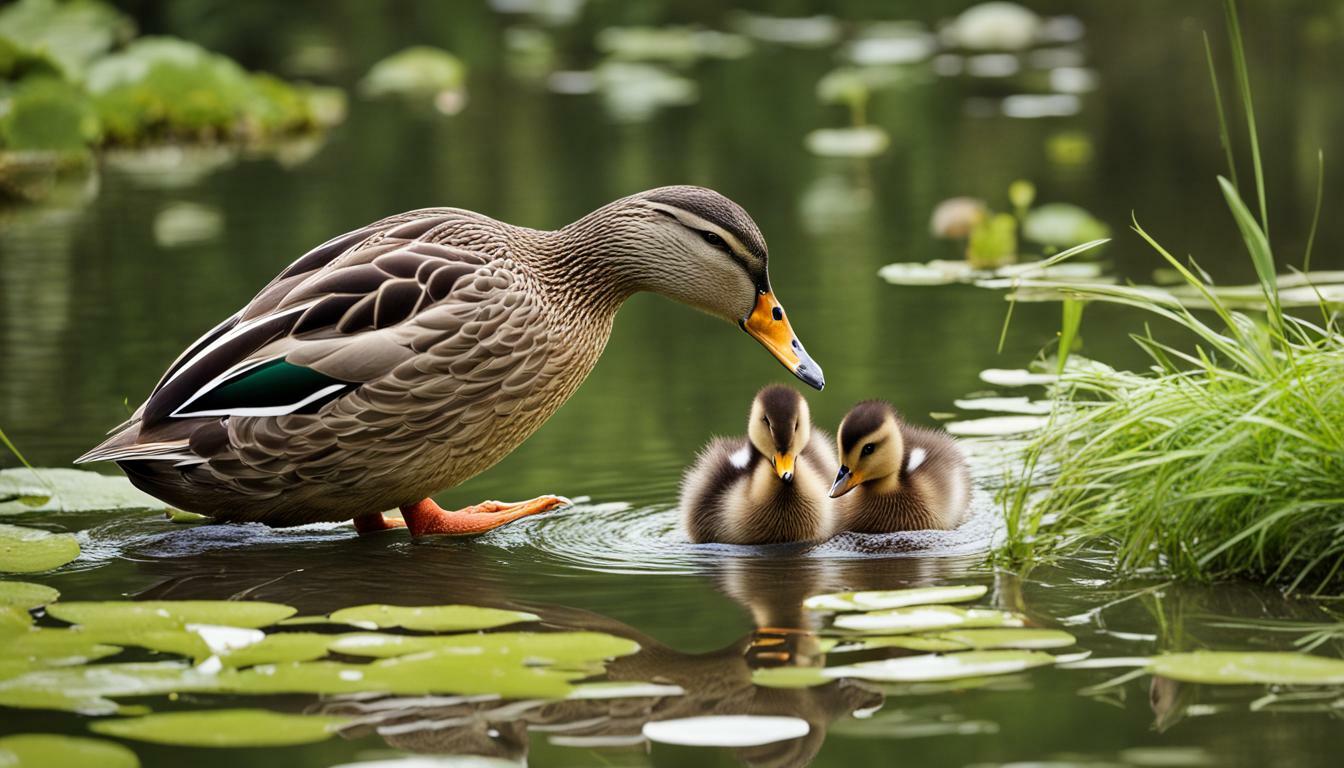Can Ducks Eat Bok Choy?

Table of content:
- Ducks and Their Diets
- Why Bok Choy?
- Nutritional Benefits of Feeding Bok Choy to Ducks
- Considerations For Feeding Bok Choy to Ducks
- Safely Incorporating Bok Choy Into a Duck’s Meal Plan
- Potential Risks of Feeding Ducks Bok Choy
- Delicious Ways to Serve Bok Choy
- Other Leafy Greens Ducks Can Eat
- The Verdict on Feeding Ducks Bok Choy
Ducks are omnivorous birds with diverse dietary needs. Bok choy is a nutritious cruciferous vegetable that can benefit ducks when fed appropriately.
Introducing bok choy as part of a balanced diet can provide ducks with essential vitamins, minerals, fiber and more, while mitigating potential risks. This article explores how to safely incorporate bok choy into a duck’s meal plan.
Ducks and Their Diets
Ducks have omnivorous appetites consisting of both plant and animal matter. Their natural diets include:
- Aquatic plants and algae
- Grasses
- Seeds
- Aquatic invertebrates like insects, mollusks and crustaceans
To stay healthy, ducks require balanced nutrition including:
- Protein
- Healthy fats and carbohydrates
- Vitamins and minerals
- Fiber
- Water
With proper portions and variety, duck owners can design nutritious diets utilizing household staples like fruits, vegetables, grains and quality proteins.
 Why Bok Choy?
Why Bok Choy?
Bok choy, also called Chinese cabbage, is a highly nutritious cruciferous vegetable loaded with vitamins, minerals and antioxidants.
Some key nutrients found in bok choy include:
| Nutrient | Function | Benefit |
|---|---|---|
| Vitamin C | Immunity, collagen production | Powerful antioxidant |
| Vitamin K | Bone & blood health | Aids blood clotting |
| Vitamin A | Vision, cell growth | Supports mucous membranes |
| Potassium | Nerve signaling, fluid balance | Boosts muscle & heart health |
| Calcium | Bone strength, nerve function | Strengthens bones & beak |
Additionally, bok choy contains cholesterol-lowering fiber and is low in calories.
With this stellar nutrition profile, bok choy can be an excellent addition to a duck’s diet when fed properly.
Nutritional Benefits of Feeding Bok Choy to Ducks
Introducing bok choy provides ducks with substantial vitamin, mineral and antioxidant nourishment.
A Powerhouse of Vitamins
Bok choy contains 7 vitamins including A, C, E, K, B6, folate and thiamin.
- Vitamin A (from beta-carotene) benefits vision, skin, feathers and mucous membrane health.
- Vitamin C wields antioxidant power to support immunity and collagen production.
- Vitamin K activates proteins for blood clotting and bone development.
These fat-soluble vitamins require fat consumption for absorption.
Abundant Minerals
Minerals in bok choy aid enzyme function, fluid balance, bone density, metabolism and nerve transmission.
- Potassium – Supports heart rate, muscle contraction and electrolyte balance
- Calcium – Boosts bone, beak, feet and eggshell strength
- Iron – Oxygenates blood to energize ducks’ active lifestyles
- Magnesium – Activates over 300 enzyme reactions
Fiber for Digestive and satiety Support
With 2 grams of fiber per cup, bok choy promotes:
- Healthy digestion and waste elimination
- Slowed nutrient absorption for steady energy
- A feeling of fullness between meals
The indigestible fiber also feeds good gut bacteria in ducks’ digestive tracts.
Low-Calorie Nutritional Powerhouse
With only 9 calories per cup, bok choy provides volume and nutrients without excess energy. This makes it a smart choice for ducks prone to obesity.
Considerations For Feeding Bok Choy to Ducks
While bok choy has nutritional merit for ducks, proper preparation and portion control are key.
Mind the Portion Sizes
Since bok choy lacks some key nutrients, it should supplement rather than replace balanced duck feed. Appropriate serving sizes vary by breed and age:
- Baby ducklings – Sparse shreds
- Medium ducks – 1 cup chopped pieces per day
- Large ducks – 2 cups chopped pieces per day
Chop Well to Prevent Choking
Ducks gulp their feed and bok choy leaves could present a choking risk. Thoroughly chop or shred leaves into tiny pieces to allow safe swallowing.
Quartered baby bok choy heads are a duck-friendly size.
Balance Bok Choy with Complete Feeds
Bok choy lacks some key elements required in a duck’s main diet like:
- Amino acids from animal proteins
- Some B vitamins absent in plants
Thus, a nutritionally-complete commercial duck feed should constitute 75% of total feed. Bok choy then provides supplemental nutrition.
Safely Incorporating Bok Choy Into a Duck’s Meal Plan
With mindful preparation and balance, bok choy can boost duck diets. Here’s how to add it in:
Mix With Commercial Duck Feed
Chopped bok choy can be hand-mixed into dry or soaked commercial feed. For young ducklings, finely shred a small pinch of leaves into bite-sized bits.
Provide Bok Choy as a Fresh Treat
Ducks relish fresh greens! Separate from main feedings, chopped bok choy makes a hydrating, low-calorie treat.
Prepare a Mixed Salad
For diversity, dice bok choy with dark leafy greens like kale and spinach plus vegetable shreds like carrot. Sprinkle in chickpea or quinoa for protein.
Stir Bok Choy Into Hot Cereal
Warm, soaked duck feed and grains like brown rice or oatmeal can be boosted with shredded bok choy and mixed hard boiled egg.
Potential Risks of Feeding Ducks Bok Choy
While bok choy benefits ducks in moderation, overfeeding may cause issues.
Weight Gain and Nutrient Imbalances
Like most treats, bok choy should not dominate feed. Too much can lead to obesity and Create vitamin & mineral deficiencies or toxicities.
Digestive Upset
If consumed in excess, the high fiber content of bok choy could potentially cause temporary gastrointestinal issues in some ducks. Diarrhea or constipation may occur.
Medication Interactions
Bok choy contains vitamin K which assists blood clotting. Ducks taking blood-thinning medications like aspirin may need to avoid bok choy due to possibly counteractive effects.
If any adverse effects occur after feeding bok choy, immediately consult an avian veterinarian.
Delicious Ways to Serve Bok Choy
When included properly in a balanced diet, bok choy makes for a nutritious, low-calorie supplement. Here are tasty recipe ideas:
Simple Bok Choy Salad
Ingredients:
- 2 cups chopped bok choy
- 1 shredded carrot
- 1⁄4 cup blueberries
- 1⁄4 cup quinoa
- 2 Tbsp hemp seeds
- 1 tsp olive oil
- Herbs like parsley or cilantro
Instructions:
- Finely chop bok choy leaves and stems
- Grate carrot and fold all ingredients together
- Top with fresh herbs
Vegetable Bok Choy Stir-Fry
Sauté chopped bok choy with diced carrots, broccoli and shelled edamame then serve warm over brown rice. Sprinkle in omega-3 rich flaxseed.
Immunity Booster Soup
Simmer chopped bok choy with bone broth, turkey meatballs and lentils. Ladle over oatmeal.
Other Leafy Greens Ducks Can Eat
While nutritious, for balanced nutrition bok choy should be rotated with other vegetables like:
- Lettuce – Romaine, green leaf
- Spinach – Iron-rich, hinders calcium absorption
- Kale – Calcium & antioxidant king
- Broccoli – Immune & bone support
- Cauliflower – Low calorie with vitamin C
Starchy vegetables like winter squash and fibrous root vegetables such as carrots, sweet potato and beets also make excellent duck treats.
The Verdict on Feeding Ducks Bok Choy
In conclusion, bok choy is a nutritious supplement that can be fed to ducks alongside a balanced diet. Its wealth of vitamins, minerals and fiber provides immune support, digestive health and satiety. Just mind proper portion sizes and chop well to prevent choking.
When included responsibly as part of a varied diet, bok choy can benefit ducks greatly. Further exploration of healthy food options can help duck owners formulate nutritious diets.
Welcome. I’m Adreena Shanum, the proud owner of this website, and I am incredibly passionate about animals, especially poultry. I founded adreenapets.com as a labor of love, stemming from my desire to share my knowledge and experiences with poultry enthusiasts worldwide.




